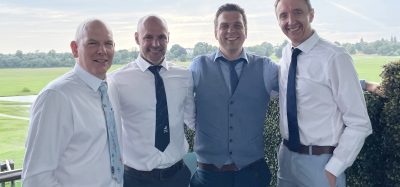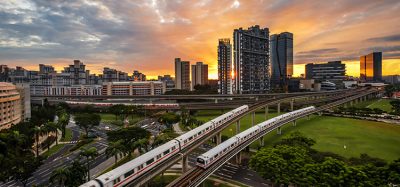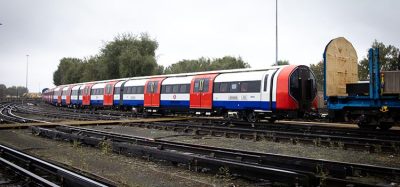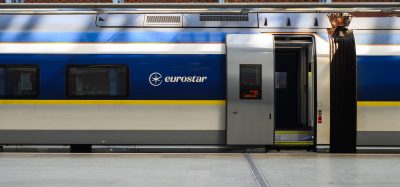The people behind the wheel – Rachel Geliamassi’s story, Great Western Railway
Posted: 10 September 2024 | Rachel Geliamassi - Great Western Railway | No comments yet
For the latest instalment of ‘The people behind the wheel’ series, Rachel Geliamassi, Customer Service Director at Great Western Railway, spoke to Global Railway Review’s Halimah Haque about her journey into the rail industry, highlighting her passion for customer service and the pivotal role of human connection in transport.
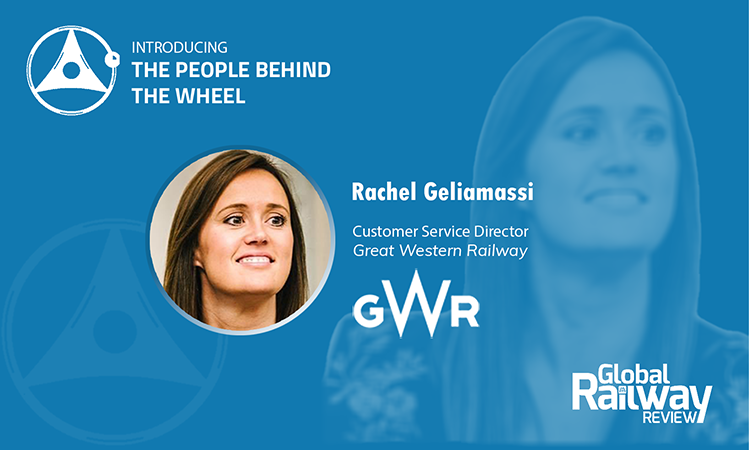

Can you provide an overview of your role at the Great Western Railway?
I officially started the role in March 2024 as Customer Service Director for Great Western Railway, which is a rail company that operates services across a big chunk of the UK, particularly around the west and southwest of the country. It’s a wonderful job. My responsibilities are to create a great experience for our customers when they interact with our stations or on-board our trains. I’m responsible for around 3,000 people that have roles in stations or a variety of different roles on the train, other than the train drivers. It’s all about, how we give a great feeling and a great experience for our passengers, and with equal measure, create that same great experience for people working within the organisation. So, I’ll be looking at opportunities to make the work environment at GWR as positive as it can be.
What inspired you to seek a career in the rail sector?
From very early on, I gravitated towards roles that dealt with people, customers, service roles because I am motivated by being around people”
I grew up in a family that were in the transport sector, and that was not rail, but bus. So I did get a sense of what it was like to be in a transport world from the experiences of my mum and my dad. I actually started working when I was 14 years old. From very early on, I gravitated towards roles that dealt with people, customers, service roles because I am motivated by being around people. I am energised and inspired by creating a really good experience for people. So entering transport, for me was less about buses moving around networks, it was actually around people and experiences and how we made people feel connecting them to where they wanted to go.
Has a career in transport changed your perception of the industry as a whole?
It really was a mission of discovery for me, working my way through transport. It had all of the great people elements and qualities that I really wanted because as I’ve said, I’m so motivated by something that involves doing things for people, working with people. Those large people organisations are my happy place.
We’re trying to co-ordinate customers to fit with our infrastructure and our processes and procedures. So how do we build something back in that gives the customer what they need or value the most”
I think I underestimated some of the blockers in transport to do what we want to do, in terms of barriers around infrastructure, and to be able to deliver a service to our customer from A to B, whatever the transport mode. If you haven’t got great infrastructure in place, you feel the consequences, and then you’re not giving your best service to the customer.
I think I underestimated how great some of those blockers would be, and it’s certainly something that we’re trying to overcome in rail at the moment.
Also, I underestimated the scale of partners and how much emphasis there would be on needing to be collaborative with so many other partners in the sector to be able to be successful. There are so many stakeholders and they’re complex relationships that require everyone to be able to deliver.
I was surprised how we were thinking inside out. In bus and in rail, we’ve built this complex structure that has been very operational, but it wasn’t built starting first with the customer’s attitudes, values and behaviours. Instead, we’re trying to co-ordinate customers to fit with our infrastructure and our processes and procedures. So how do we build something back in that gives the customer what they need or value the most? This resonates for me and is a huge challenge for us within the transport sector.
What would be the top three defining moments of your career in the transport industry thus far?
I would say the start of the journey for me, so joining a graduate programme where the first thing I did was learn to drive a bus and work in the engineering department, doing the fundamental roles in the business that are really the closest to the customer. This gave me that first spur of confidence to know that by doing those kind of roles and having that insight into the jobs in the company, would pave the right way for me as I move forward in my career.
It takes courage to disrupt yourself and do something new, particularly when you haven’t got allies in that new organisation”
I would say becoming Managing Director of a bus company in the west of England is huge. Female MDs in the UK at the time that I was there were sparse in number. We still didn’t have that diversity, that balance within the team. So, I felt very proud that I was able to make that step and show that you can do a good job of it. I was very motivated and rewarded because the engagement scores of our people across that time lifted again and again, giving me the confidence that my approach was working.
Starting my current role at GWR is naturally an important step. I’d been in a bus world for 17 years, and it can become quite comfortable being around people familiar with how to operate in that sector. It takes courage to disrupt yourself and do something new, particularly when you haven’t got allies in that new organisation. People don’t know how you work. You are not going to be the specialist in the room because it’s not been your specialism over the years previous. I’m really proud of myself to have made this change because I love being in a room full of people in a rail context and entering with a fresh pair of eyes. I think the fresh view is exactly what we need within our team at the moment, and hopefully that will add value to GWR.
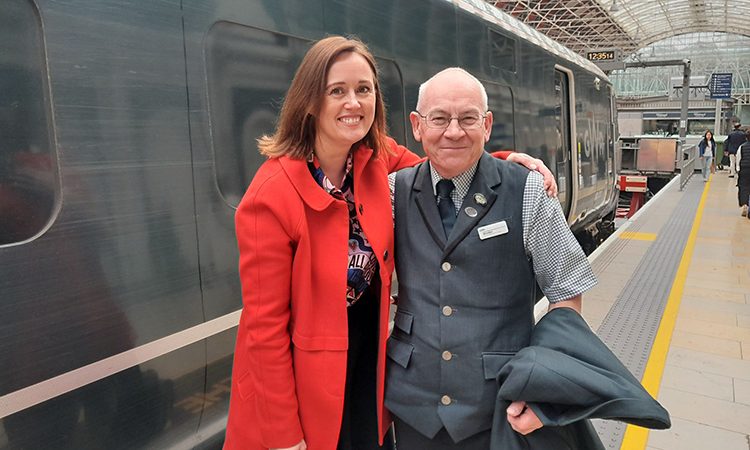

Credit: Great Western Railway
Reflecting on the future, where do you see yourself in five years’ time?
I really hope that in five years I’ll be able to see that I’ve added value to the customers that use our Great Western Railway services across the network. I hope that we see a positive response to our customer service, to how we make our customers feel. That’s fundamentally what I’m here to do, to help our customers enjoy their experience and want to travel again, to want to tell other people to do so as well because it’s a company that they trust and it’s an experience that’s certain and enjoyable.
And with equal measure, I hope that I will have been able to improve the environment of our people within the organisation, hopefully making things easier, simpler, giving people the tools and support that they need to do their role.
Speaking professionally, by making this move from bus to rail, I’ve proved that I can be bold, courageous and unafraid to disrupt myself and do different things. In the future, I hope I will have shown that I can chase dreams that are going to stretch and challenge me in new ways, and I’d like to think that I’ll continue to do that for the rest of my career.
Transitioning into a new career path or embarking on your first job search can be quite a daunting experience. With that in mind, what essential pieces of advice would you offer to individuals interested in pursuing a career in transportation?
Never sit in the pocket of that comfort zone, no matter how comfortable it feels. It is a trap to your future development”
I would say ensure that wherever your work environment is, you have at least one or two really good allies or mentors there to support you. And if you’re in an organisation that doesn’t have that structure to provide you with mentors or sponsorship, don’t let that hold you back. Seek out the people that inspire you and directly go and ask them. If you see somebody on LinkedIn that inspires you, drop them a message and ask them if they have the time to share some of their experiences with you. Be bold around getting that ally ship and mentoring because you need it to overcome that voice in your head that will give you doubt and tell you that you can’t do something. You need to be able to overcome that self-doubt and have other opinions and perspectives in your bubble that can say, you’re undervaluing yourself, or you’re underestimating your ability right now.
I would also say I really try and make a point throughout my career to disrupt myself. For example, moving from bus to rail. I don’t want a comfort zone to set in because I know that my own development will stall if I’m too familiar with everything that I’m doing. So, notice when you need to disrupt and stretch yourself and look for those opportunities to push yourself out of your comfort zone because if you do, it will better prepare you for your next role by building that collection of skills to ready you for even bigger roles in the future. Never sit in the pocket of that comfort zone, no matter how comfortable it feels. It is a trap to your future development.
What do you hope to see become more commonplace in the transport industry workforce?
For me, I hope to see empowerment become more commonplace because of the way we’ve structured our transport businesses. Again, with the process, the procedure being so operational, we’ve made complicated systems that aren’t necessarily easy for our people to navigate, just as much as we’ve created systems for our customers that aren’t easy and simple to navigate. I think making things easier and simpler externally for the customer and then within the organisation is key. And we’ve got to do it by leading with trust for our people. Our people need to be empowered to know they can make bespoke decisions that are in the best interest of our customers, and have the confidence to know that we’ve got their back because leadership teams are going to celebrate that customer-centric decision that they’ve made.
That can only come with the trust, having that psychological safety, and really nurturing empowerment of our people, but it has to go hand in hand with creating environments that are just easier to navigate in the first place. We make things far too complicated, and we need to evaluate if they are still fit for purpose or still hold the value they may have held in the past.
In an ideal world, what do you hope the future of public transport will look like?
I want to imagine a future where partnerships are at their most optimal between all the stakeholders that impact travel experiences and impact people connecting across our communities”
I want to imagine it full of beautiful, blended people of all sorts of backgrounds, because I think that makes for the most wonderful customer experience. But, that’s got to be off the back of having flexibility in how people can work. That’s something we’re trying to work through in terms of creating environments for our people where they can work more flexibly, because that will encourage those beautiful, diverse, blended people to come in.
I want to imagine a future where partnerships are at their most optimal between all the stakeholders that impact travel experiences and impact people connecting across our communities. Whether it’s the way we work with our local councils or accessibility groups, whoever the stakeholders, whether it’s with our infrastructure providers, our technology providers, those partnerships really do need to be optimal. I want to see partnerships have a can-do attitude because we can always talk ourselves out of doing things, but we need to be true for us to be truly transformative. Let’s put bureaucracy to one side and form meaningful partnerships to deliver a great experience for our communities.
 Rachel Geliamassi joined Great Western Railway (GWR) as Customer Service Director in March 2024. She has executive responsibility for GWR’s stations and frontline on-board teams, encompassing GWR’s 198 managed stations and over 3,000 thousand colleagues in total, and is passionate about delivering the highest quality customer service. She was previously Managing Director at Stagecoach West, covering the West of England and Oxfordshire, having joined the bus business as a graduate in 2007. Rachel also has a strong focus on diversity and inclusion, and resides in Gloucestershire with her family.
Rachel Geliamassi joined Great Western Railway (GWR) as Customer Service Director in March 2024. She has executive responsibility for GWR’s stations and frontline on-board teams, encompassing GWR’s 198 managed stations and over 3,000 thousand colleagues in total, and is passionate about delivering the highest quality customer service. She was previously Managing Director at Stagecoach West, covering the West of England and Oxfordshire, having joined the bus business as a graduate in 2007. Rachel also has a strong focus on diversity and inclusion, and resides in Gloucestershire with her family.
OUT NOW: The Definitive Guide to Rail’s Digital Future
The rail industry is undergoing a digital revolution, and you need to be ready. We have released our latest market report, “Track Insight: Digitalisation.”
This is not just another report; it’s your comprehensive guide to understanding and leveraging the profound technological shifts reshaping our industry. We move beyond the buzzwords to show you the tangible realities of AI, IoT, and advanced data analytics in rail.
Discover how to:
- Optimise operations and maintenance with real-time insights.
- Enhance passenger services through seamless, high-speed connectivity.
- Leverage technologies like LEO satellites to improve safety and efficiency.
Featuring expert analysis from leaders at Nomad Digital, Lucchini RS, Bentley Systems and more, this is a must-read for any rail professional.



